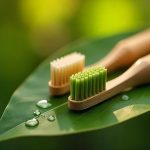Each morning, millions of Americans grab their toothbrush. It’s such a straightforward action that we hardly consider it. However, you may find it surprising that the plastic toothbrush you hold will last for hundreds of years beyond your lifetime. The typical individual uses roughly four toothbrushes annually. If you multiply that by 330 million Americans, we end up with over a billion plastic toothbrushes ending up in landfills each year. That’s a huge pile of waste that never disappears.
The Problem We Can’t Brush Away
Plastic toothbrushes are designed to endure indefinitely, which seems appealing until you understand that is precisely the issue. Constructed from different kinds of plastic and nylon, these dental care items may take 400 to 500 years to decompose. Even then, they don’t fully vanish; they merely become smaller fragments of plastic known as microplastics.
These small plastic pieces can be found all over. They drift in our seas, pollute our land, and even appear in our food chain. Researchers have discovered microplastics in fish, salt, and also in potable water. What began as a morning oral care routine turns into a persistent ecological problem.
The most frustrating aspect? A toothbrush’s lifespan is determined by the state of its bristles, not the condition of its handle. This means we’re discarding perfectly functional plastic handles solely because the cleaning component ceased to work properly.
A Green Revolution in Your Bathroom
Fortunately, according to the people at Ecofam, creative options are emerging quicker than you can utter “sustainable”. Compostable toothbrushes made from bamboo have emerged as the symbol of eco-friendly dental hygiene. Bamboo grows at an astonishing rate. Some species can reach three feet in just one day. It’s antibacterial and compostable.
Bamboo isn’t the only option available though. Producers are being inventive with substances such as cornstarch and wheat straw. This is on top of recycled products. Some companies produce toothbrush handles using recycled yogurt containers or plastic sourced from the ocean. Others produce handles that decompose safely in residential compost bins.
The bristles pose their own difficulty as the majority continue to be crafted from nylon. Nonetheless, certain brands currently provide bristles derived from castor oil or other sustainable materials. An entirely compostable toothbrush features a biodegradable handle along with bristles made from plants.
Making the Switch Without the Stress
Using an eco-friendly toothbrush won’t harm your dental health. These options clean just as well as plastic ones. The American Dental Association emphasizes a toothbrush’s ability to eliminate plaque, not the materials it is made of.
It’s a straightforward change. As soon as your toothbrush is worn, swap it for an environmentally friendly one. You won’t notice a change in your daily routine. The grip might feel odd at first. Nevertheless, most people adjust quickly. Eco-friendly toothbrushes usually cost more initially. However, the price gap shrinks with increased demand and production. Many people find the small extra cost worthwhile for the environmental benefits.
Small Changes, Big Impact
Companies pay attention when clients seek improved choices. Our buying habits fuel progress and environmental responsibility. Each sustainable toothbrush minimizes plastic in landfills. Over a lifetime, a person could prevent numerous plastic toothbrushes from becoming permanent waste. Consider the environmental impact when millions of people make the same choice.
Conclusion
The demand for environmentally conscious dental hygiene products is increasing. Sustainable choices will be the norm. Especially as technology improves and costs decrease. This trend is evident in many bathroom products. Think bamboo toilet paper and reusable soap dispensers. You can easily make your lifestyle greener. Just change to an eco-friendly toothbrush. This small change has a big impact. It proves that the simplest changes often bring the best results.
 How Medicare Advantage Plans 2026 Improve Access to Preventive Care
How Medicare Advantage Plans 2026 Improve Access to Preventive Care  Turning the Tide on Plastic Waste, One Toothbrush at a Time
Turning the Tide on Plastic Waste, One Toothbrush at a Time 